Ralph Ketcham - The Anti-Federalist Papers and the Constitutional Convention Debates
Here you can read online Ralph Ketcham - The Anti-Federalist Papers and the Constitutional Convention Debates full text of the book (entire story) in english for free. Download pdf and epub, get meaning, cover and reviews about this ebook. year: 2003, publisher: Penguin, genre: Politics. Description of the work, (preface) as well as reviews are available. Best literature library LitArk.com created for fans of good reading and offers a wide selection of genres:
Romance novel
Science fiction
Adventure
Detective
Science
History
Home and family
Prose
Art
Politics
Computer
Non-fiction
Religion
Business
Children
Humor
Choose a favorite category and find really read worthwhile books. Enjoy immersion in the world of imagination, feel the emotions of the characters or learn something new for yourself, make an fascinating discovery.
- Book:The Anti-Federalist Papers and the Constitutional Convention Debates
- Author:
- Publisher:Penguin
- Genre:
- Year:2003
- Rating:5 / 5
- Favourites:Add to favourites
- Your mark:
- 100
- 1
- 2
- 3
- 4
- 5
The Anti-Federalist Papers and the Constitutional Convention Debates: summary, description and annotation
We offer to read an annotation, description, summary or preface (depends on what the author of the book "The Anti-Federalist Papers and the Constitutional Convention Debates" wrote himself). If you haven't found the necessary information about the book — write in the comments, we will try to find it.
Ralph Ketcham: author's other books
Who wrote The Anti-Federalist Papers and the Constitutional Convention Debates? Find out the surname, the name of the author of the book and a list of all author's works by series.
The Anti-Federalist Papers and the Constitutional Convention Debates — read online for free the complete book (whole text) full work
Below is the text of the book, divided by pages. System saving the place of the last page read, allows you to conveniently read the book "The Anti-Federalist Papers and the Constitutional Convention Debates" online for free, without having to search again every time where you left off. Put a bookmark, and you can go to the page where you finished reading at any time.
Font size:
Interval:
Bookmark:

THE RIGHTS OF THE INDIVIDUAL VERSUS
THE POWER OF THE GOVERNMENT
Should the members of the government be elected by direct vote of the people? Should the central government of the United States be stronger than the individual state governments? Does slavery have any place in a nation dedicated to liberty? Should the government be headed by a single executive, and how powerful should that executive be? Should immigrants be allowed into the United States? Which citizens should have the vote? How should judges be appointed, and what should their role in government be? What human rights should be safe from government infringement? In 1787, these important questions and others were raised as the states debated the merits of the proposed Constitution. Along with The Federalist Papers, this invaluable book documents the political context in which the Constitution was born.
T HE
A NTI -F EDERALIST P APERS
AND
T HE C ONSTITUTIONAL
C ONVENTION D EBATES

EDITED AND WITH AN INTRODUCTION BY
Ralph Ketcham

SIGNET CLASSICS
Ralph Ketcham is Professor of History and Political Science at the Maxwell School of Citizenship and Public Affairs of Syracuse University. He is the author of many books on American History, including Presidents Above Party: The First American Presidency; From Colony to Country: The Revolution in American Thought, 1750-1820; and James Madison: A Biography.
SIGNET CLASSICS
Published by New American Library, a division of Penguin Group (USA) Inc., 375 Hudson Street, New York, New York 10014, USA
Penguin Group (Canada), 90 Eglinton Avenue East, Suite 700, Toronto, Ontario M4P 2Y3, Canada (a division of Pearson Penguin Canada Inc.)
Penguin Books Ltd., 80 Strand, London WC2R 0RL, England
Penguin Ireland, 25 St. Stephens Green, Dublin 2, Ireland (a division of Penguin Books Ltd.)
Penguin Group (Australia), 250 Camberwell Road, Camberwell, Victoria 3124, Australia (a division of Pearson Australia Group Pty. Ltd.)
Penguin Books India Pvt. Ltd., 11 Community Centre, Panchsheel Park, New Delhi - 110 017, India
Penguin Group (NZ), 67 Apollo Drive, Rosedale, Auckland 0632, New Zealand (a division of Pearson New Zealand Ltd.)
Penguin Books (South Africa) (Pty.) Ltd., 24 Sturdee Avenue, Rosebank, Johannesburg 2196, South Africa
Penguin Books Ltd., Registered Offices:
80 Strand, London WC2R 0RL, England
Published by Signet Classics, an imprint of New American Library, a division of Penguin Group (USA) Inc. Previously published in a Mentor edition.
First Signet Classics Printing, May 2003
10 9 8 7 6 5 4 3 2
Copyright Ralph Ketcham, 1986
All rights reserved. No part of this book may be reproduced, scanned, or distributed in any printed or electronic form without permission. Please do not participate in or encourage piracy of copyrighted materials in violation of the authors rights. Purchase only authorized editions.
ISBN: 978-1-101-65134-6
The documents in the sections on the ratification contest by Brutus, Cato, Centinel, Federal Farmer, John Dewitt, Patrick Henry, Melancton Smith, and the Pennsylvania Minority are reprinted from The Complete Anti-Federalist (seven-volume set), edited by Herbert J. Storing with the assistance of Murray Dry, The University of Chicago, 1981; all rights reserved; vol. II, 116-19, 136-43, 223-34, 363-72, 382-87, 393-400, 413-28, 437-46; vol. III, 146-65; vol. V, 211-29; vol. VI, 149-69, 171-73, with the generous permission of the University of Chicago Press. Some of the documents are also included in The Anti-Federalist: An Abridgement of the Seven-Volume Set of the Complete Anti-Federalist, edited by Herbert J. Storing and abridged by Murray Dry, The University of Chicago, 1981, 1985; all rights reserved.
 REGISTERED TRADEMARKMARCA REGISTRADA
REGISTERED TRADEMARKMARCA REGISTRADA
Printed in the United States of America

| ALWAYS LEARNING | PEARSON |
The Revolutionary Background
of American Constitutional Thought
For anyone interested in political thought in action, the United States during the 1770s and 1780s is perhaps the most exciting period in the countrys history. The discussion of political ideas that accompanied the American Revolution was seminal to the effort in 1787-1788 to draft and ratify a new constitution for the United States. In the years before 1776, as tension increased between Great Britain and her North American dominions, the rapidly maturing colonies were a laboratory of proposals and revised forms of union and confederated government. Each colony was more or less self-governing under its own constitution, but officials on both sides of the Atlantic probed for a more satisfactory relationship between the colonies and the mother country. The eleven years between the Stamp Act Crisis (1765) and the Declaration of Independence (1776) were years of vigorous, creative political thinking which produced hundreds of pamphlets, newspaper articles, and other writings on questions of representative government and confederation. Writers in Great Britain, too, debated basic political principles and regarded the many proposals for governing the empire as part of the quest for freer, eventually more democratic government.
Political independence, moreover, required new modes of thinking not only about the government but also about national identity. Initially, Britons in America often felt a sharp sense of loss in their repudiation of loyalty to the mother country. Gone or discredited were important parts of the body politic and their undergirding ideas. Revolutionists challenged the House of Lords, military institutions and traditions, and even the monarch himselfsymbol and embodiment of the nation. Colonials who still thought of England as home regretted, too, the distancing from a cherished land and culture; Salisbury Plain and London, Shakespeare and Milton, the ale house and the parish church remained deep in the consciousnessor subconsciousnessof many transatlantic Britons. Americans were uneasy about giving up this national identity and hence moved slowly and reluctantly toward independence. Many remained loyalists because they could not countenance such traumatic loss. Yet, by 1776, the radical change in the principles, opinions, sentiments, and affections [that] was the real American Revolution, as John Adams put it, had taken place: Americans no longer thought of themselves as members of the British body politic; they were no longer part of what they, and most enlightened European opinion, often regarded as the freest, best-governed nation in the world.
New institutions and new ideas of government were needed, then, to replace the rejected British models. Yet, as the revolutionary tracts showed, and as the debate over the new constitution would demonstrate anew, Americans had very little beyond British ideology and experience with which to fashion a new nationhood. All the best-known writersHarrington, Locke, Hutcheson, Algernon Sidney, Swift, Trenchard and Gordon, Price, Burgh, and even the works of Voltaire and Montesquieu idealizing British governmentfocused American attention on English history and thought. Within this thoroughly British pattern, however, American political thinkers began to express vital differences in emphasis. Traditional, Tory ideas had much less weight in America than they had in Britain. Ancient institutions such as the Church, the nobility, and the common law weakened in the New World. The palaces and fortresses of authority could not cross the Atlantic Ocean. On the other hand, radical Whig thought, emphasizing openness and freedom, loomed proportionately larger in America. A century and one half of physical separation and relatively isolated development had nurtured what in many ways were distinctive societies. As political leaders sought after 1776 to move from colony to country, they used British concepts and precedents, but they also fashioned anew for a new nation in a New World. To an initial revolution in loyalty which repudiated a nationality, Americans had to add a second revolution in purpose that would form ideas and institutions for a new polity.
Font size:
Interval:
Bookmark:
Similar books «The Anti-Federalist Papers and the Constitutional Convention Debates»
Look at similar books to The Anti-Federalist Papers and the Constitutional Convention Debates. We have selected literature similar in name and meaning in the hope of providing readers with more options to find new, interesting, not yet read works.
Discussion, reviews of the book The Anti-Federalist Papers and the Constitutional Convention Debates and just readers' own opinions. Leave your comments, write what you think about the work, its meaning or the main characters. Specify what exactly you liked and what you didn't like, and why you think so.

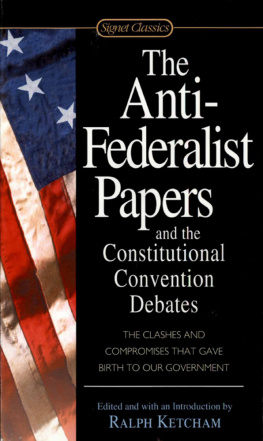
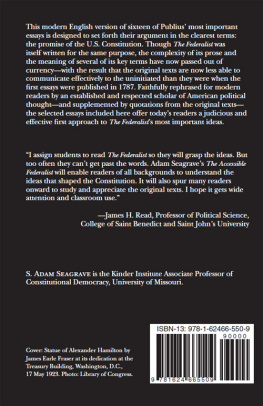

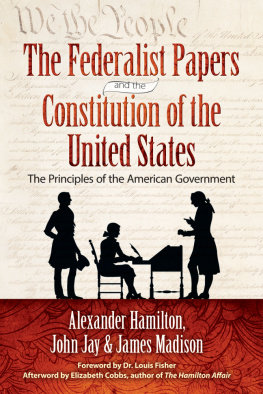
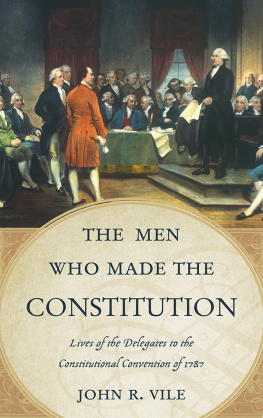
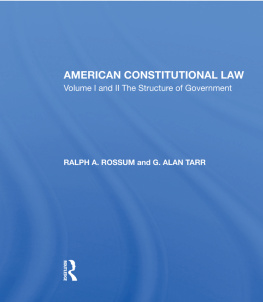
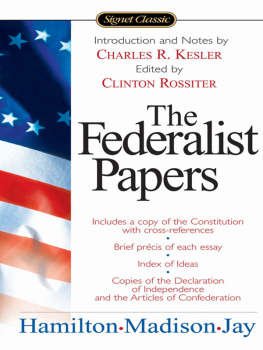
![Jay John - The Federalist : a collection of essays, written in favour of the new Constitution, as agreed upon by the Federal Convention, September 17, 1787. : In two volumes. Vol. I[-II.]](/uploads/posts/book/76130/thumbs/jay-john-the-federalist-a-collection-of-essays.jpg)

